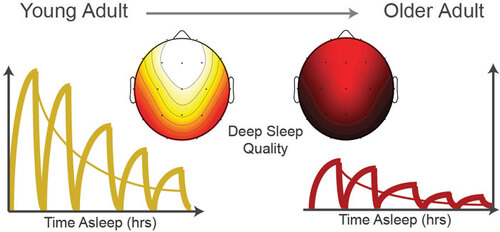

Aging is tied to numerous health concerns. Poor sleep can contribute to many of these problems, reducing quality of life in people as they get older.
In order to address the unique needs of older adults, it is more important than ever to understand the effects of aging on sleep and overall health. We take a closer look at the relationship between aging and sleep, common sleep issues, and sleep tips for older adults.
Why Does Aging Affect Sleep?
It is common for older adults to experience changes in the quality and duration of their sleep. Many of these changes occur due to changes in the body’s internal clock. Located in a part of the brain called the hypothalamus, this internal clock is made of around 20,000 cells that form the suprachiasmatic nucleus (SCN).
The SCN controls 24-hour daily cycles, called circadian rhythms. These circadian rhythms influence when people get hungry, when the body releases certain hormones, and when a person feels sleepy or alert.
As people get older, their sleep changes due to effects of an aging SCN. Deterioration in the function of the SCN can disrupt circadian rhythms, directly influencing when people feel tired and alert.
The SCN receives information from the eyes, and light is one of the most powerful cues for maintaining circadian rhythms.
Unfortunately, research shows that many older people have insufficient exposure to daylight, averaging around one hour each day. Daylight exposure may be even more restricted for people who live in nursing homes as well as those with Alzheimer’s disease.
Changes in production of hormones, such as melatonin and cortisol, may also play a role in disrupted sleep in older adults. As people age, the body secretes less melatonin, which is normally produced in response to darkness and helps promote sleep by coordinating circadian rhythms.
Health Conditions and Sleep
Mental and physical health conditions may also interfere with sleep. Conditions that commonly affect sleep in older people include depression, anxiety, heart disease, diabetes, and conditions that cause discomfort and pain, such as arthritis.
The relationship between physical health and sleep is complicated by the fact that many older adults are diagnosed with more than one health condition.Those with multiple health conditions are more likely to report getting less than six hours of sleep, having poor sleep quality, and experiencing symptoms of a sleep disorder.
Sleep issues may also be related to the side effects of medications. Almost 40% of adults over the age of 65 take five or more medications. Many over-the-counter and prescription drugs can contribute to sleep issues. The interactions of multiple medications may also cause unanticipated effects on sleep.
Lifestyle and Sleep
Poor sleep quality in older adults can be related to the lifestyle changes that often come with aging. For example, retirement may lead to a less structured sleep-wake schedule. Other significant life changes, such as loss of independence and social isolation, can increase stress and anxiety, which can also contribute to sleep issues.
How Does Aging Affect Sleep?
Aging affects people differently. While some older adults may have no significant disruptions in their sleep, others complain about getting less sleep and having worse sleep quality. Experts have found several common sleep disturbances in older adults.
Shifting sleep schedule: As people age, the body’s circadian rhythms actually shift forward in time. This shift is called a phase advance. Many older adults experience this phase advance as getting tired earlier in the afternoon and waking up earlier in the morning.
Waking up at night: Research has also shown that as people get older, they often experience changes in their sleep architecture. Sleep architecture refers to how people cycle through the different stages of sleep. Older adults spend more time in the earlier, lighter stages of sleep and less time in the later, deeper stages. These shifts may contribute to older people waking up more often during the night and having more fragmented, less restful sleep.
Daytime napping: Research estimates that about 25% of older adults take naps, compared with around 8% of younger adults . While some experts suggest that a short daytime nap may be beneficial, many agree that extended napping and napping later in the day can make it harder to fall asleep at bedtime and create nighttime sleep disruptions.
Longer recovery from changes in sleep schedule: Alterations in how the body regulates circadian rhythms make it more difficult for older people to adjust to sudden changes in their sleep schedules, like during daylight saving time or when experiencing jet lag.
Do Older People Need Less Sleep?
It is a common misconception that older adults require less sleep than younger individuals. Many older adults have a hard time getting the sleep they need, but that does not mean they need less sleep. In general, adults should aim to get at least seven hours of sleep each night.
Written by
Medically Reviewed by
John DeBanto, Internal Medicine Physician
